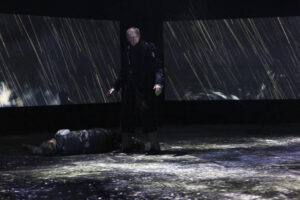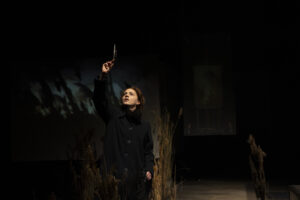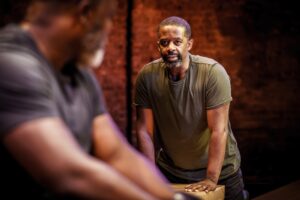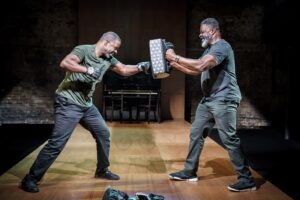Kate Mosse’s first play provides a dramatic opening to new Chichester season
★★★

The opening of this year’s Chichester Festival Theatre season could not be more dramatic. I’ve rarely felt such goosebumps as when the lights went up on The Taxidermist’s Daughter began: an initial jump at the loud discordant sound and disturbing lighting, churchgoers frightened by hanging dead crows, a chilling recitation of Who Killed Cock Robin.
This play has Chichester running in its veins. It is written by Chichester resident and Festival Theatre stalwart Kate Mosse, and set in nearby Fishbourne. I don’t know how much of the credit goes to Kate Mosse and how much to director Roisin McBrinn, but this is a play designed for the Festival Theatre space and the production works perfectly there.
Unfortunately, the gothic horror story doesn’t quite live up to the production. The evocation of a bygone time and place, and the sense of the past contained in the present are excellent. However, Kate Mosse has made the decision to turn her original mystery story into a revenge play while retaining a question mark over the whys and wherefores of what’s going on. The belated explanation means that I for one found it hard to understand or sympathise with the revenge that a mystery woman is carrying out.
The play lacks the tension of the best thrillers: the killing spree doesn’t even begin until the end of act one. And the mystery doesn’t grip enough to justify the delay, despite raising many questions: who are the women who have escaped from the local asylum, who has hung dead crows in the church, what happened all those years ago, why are people being killed, are these connected? Spoiler alert- yes they are!
Connie Gifford can’t remember the details of a traumatic event in her childhood. She is trying to continue her drunken father’s tottering taxidermy business and is troubled by both the past and present. Daisy Prosper conveys well her sweet disposition and vulnerability.
We eventually learn that a group of leading men from the community committed crimes and, because of their position in society and because the crimes were against women, they have got away with it. ‘The men charged to protect us are the ones we must fear the most.’
The message is perennial. Inevitably we will think that not enough has changed a hundred years on, when powerful men like Jimmy Savile and Jeffrey Epstein get away with crimes against women and girls for years. But, for audiences of revenge fiction, taking the law into one’s own hands is a cathartic response to the failures of the system.
The stars of the show are the creative team
The Taxidermist’s Daughter is not as spooky as The Woman In Black nor as bloody and grand guignol as the recent production of The Lieutenant Of Inishmore which starred Aidan Turner. Nevertheless, it does a decent job in both those genres.
In this, the play is helped enormously by the creative team, who are the real stars of the show. Sinead Diskin’s frightening music and sound and the stark, flashing lighting designed by Prema Mehta. Paul Wills’ set design keeps the stage bare. Sinister black-and-white projections proliferate- on the back wall, the floor and on hanging screens. These often take the form of extraordinary videos by Andrzej Goulding, which show us fragments of faces, dark foliage, water- oh yes, the water. I’ve seen a lot of water on this stage over the years but this projection of splashing water onto the floor was more convincing than any real water I’ve seen.
And water is significant because Fishbourne is marshland and it’s 1912, the year of the great flood, and the action takes place as the deluge begins. So the mystery woman may be seen as washing out evil from the community.
The production uses every square inch of the stage. There are entrances from all directions, and pieces of set- often stuffed birds in display cabinets- rise from a multitude of holes in the floor. It does what theatre does best: it inspires the imagination. In fact, the scariest moment is probably when we finally see the crime, and that’s because we don’t actually see it, but are given all the information we need to imagine it.

Many of the characters are sketched rather than detailed portraits. Pearl Chandra as the mystery murderer is passionate and energetic without going over the top. Forbes Masson does well as Connie’s father Crowley Gifford, a man plagued with guilt about what happened in his past, who is now barely holding himself together.
We also meet a nice man: Harry, a gentle young artist, played by Taheen Modak. Although the play focuses on the position of women in early 20th ventury society, men too had to know their place, so it’s good to see at least one young man whois nice and gentle and breaks free from the chains of a professional career to become an artist. It’s not overtly stated in the play but it’s hard not to remember that this young man is only a couple of years away from being sent to the slaughter of the first world war, a victim of powerful old men, in a war that will change the village more than the flood.
But maybe that’s putting too much weight on what is in the end an enjoyable gothic horror story in a glorious production.
The Taxidermist’s Daughter can be seen at Chichester Festival Theatre until 30 April 2022. Click here for tickets and information.
The reviewer was given a press ticket by the producers.
Click here to watch this review on the One Minute Theatre Reviews YouTube channnel

